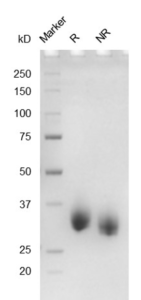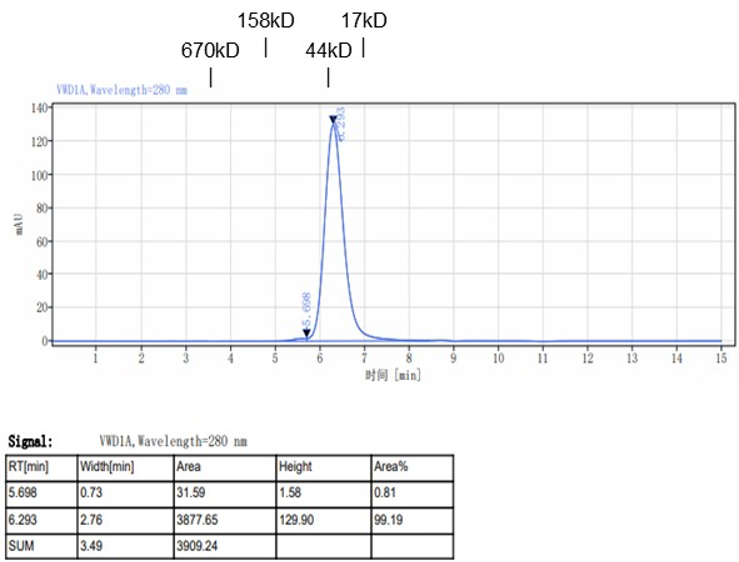hPDL1(19-238)-His
Description
Programmed cell death 1 ligand 1 (PDL1) is one of the ligands for programmed cell death protein 1 (PD1). It belongs to the B7 family and immunoglobulin superfamily, along with B7-1 and B7-2. The PD1-mediated inhibitory pathway is exploited by tumors to attenuate anti-tumor immunity and evade destruction by the immune system, thereby facilitating tumor survival. PDL1 modulates the activation threshold of T-cells and restricts their effector response. Its interaction with PD1 initiates a negative signaling cascade in T cells, leading to inhibition of T cell activation. PDL1 plays a pivotal role in inducing and maintaining immune tolerance to self. It provides a molecular stop signal to the adaptive immune system, aiding in distinguishing between self and foreign antigens. Additionally, PDL1 contributes to the development of immune tolerance by promoting T cell anergy and enhancing regulatory T cell development. Increased expression of PDL1 has been associated with suppression of antitumor immune response in cancer as well as upregulation of IL10 production in HIV-infection, resulting in heightened susceptibility of antigen-specific T cells to apoptosis. It may inhibit ongoing T-cell responses through induction of apoptosis and arrestment of cell-cycle progression. Numerous cancers exhibit elevated levels of PDL1 protein expression, which have been correlated with increased tumor aggressiveness and poor prognosis. Consequently, it is considered a promising therapeutic target for human autoimmune diseases and malignant cancers.
Product name | hPDL1(19-238)-His |
Species | Homo sapiens |
Expression system | HEK293 |
Buffer | PBS, pH 7.4 |
Delivery condition | Dry ice (-80°C) |
Delivery Time | 1 week if in stock; 4 weeks if production needed |
Storage condition | Store at -80°C |
Brand | BioMetas |
Applications | AIDS/HIV, Allergy Research, Cancer Research, Immune Checkpoint, Immune System, Immunotherapy, Inflammation Research, Targeted Therapy |
Aliases/Synonyms | PDCD1 ligand 1, PDCD1LG1, PDCD1L1, PD-L1, CD274, B7-H1, B7H1, B7-H, SLEB2, SLE1 |
Reference | |
Note | For research use only. Not suitable for clinical or therapeutic use. |
Size | 1mg, 5mg, 10mg, 50mg, 100mg |
Brand | BioMetas |
Product type | Antigen |
Expression system | HEK293 |
Applications | AIDS/HIV, Allergy Research, Cancer Research, Immune Checkpoint, Immune System, Immunotherapy, Inflammation Research, Targeted Therapy |
Contact Us for a Quote!
Data Gallery
Fig. 1.) 4-20% SDS-PAGE analysis
Recombinant protein was visualized by Coomassie Brilliant Blue R250 staining.

Fig. 2.) SEC-HPLC analysis
Column: Superdex 200 Increase 5/150 GL
Running buffer: 2xPBS, pH 7.4
